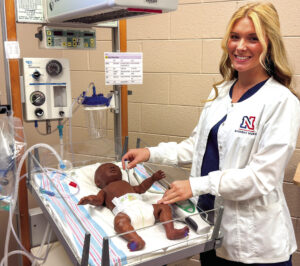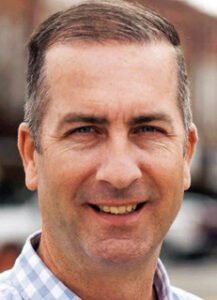Moving forward
Rev. Charles Dale and members of the St. Paul C.M.E. Church of Russellville march during a “Black Lives Matter” rally during January.
by Lauren Thornton Tobin for the FCT
February is coming to a close and so is Black History Month. It has been a month to celebrate all that the African-American community has overcome throughout the years and remember those who suffered.
The release of the movie “Selma” drew more attention than usual to the South’s involvement in the Civil Rights Movement, the tragedies that occurred during that period and the great accomplishments of the brave men and women who participated.
Although there was no march in Franklin County, there were no sit-ins or boycotts, black members of the community felt tensions from places like Birmingham and Tuscaloosa. They also empathized.
Jack Dale has lived in Russellville for most of his life. He left Alabama to join the Air Force where he served in Southeast Asia during the Vietnam War. When his service was over he moved to Illinois where he lived for 20 years.
Living at a distance from the events in Alabama did not make it easier on Dale because of the family he had in Franklin County.
“It bothered me just as much because my mother was still here and I knew what they were going through,” he said, adding that his siblings were also still in the South.
Dale said that things were different in the North. Racism was not open and bragged about, and a black man had a chance to move up in the workplace.
“It was still there, but it was kind of undercover. It wasn’t as open as it was down here in Alabama,” he said. “They had to kind of conceal their behavior there too. There was too much going on from the government about equal hiring and people had to be a little careful about how they acted.”
Dale remembers the struggles that he endured as a child, such as walking down a sidewalk and being forced off of it because a group of white men and women chose to walk in a horizontal line, giving Dale no room to pass.
He said he also remembers unpleasant words thrown his way.
“They used that word, you know, the N-word. It was kind of humiliating to me because I never thought anybody was better than me. Nobody was better than anyone else,” Dale said. “I was real into the scripture because that’s the only thing you can hold onto about life. At some point, you are going to get out of that place we were projected into and prevail.”
Dale said things are better today in terms of racism, but society still has a long way to go.
“A lot of older people have come to realize that all of that stuff they had to be a part of—they had to condone some stuff that they didn’t really agree with,” Dale said.
“Even though situations are less hostile than they were during the 60s, people still have a problem when it comes to racial matters,” Dale said.
Beverly Harvey, 69, has lived in Franklin County most of her life. She remembers as a child being taught things that were and were not acceptable by black people in the white community.
“We were made aware of things that blacks didn’t do and did do,” she said. “There were restaurants where black people had to go to ‘colored’ doors or windows and there were places in Russellville where blacks were not served at all.”
Harvey said she knew about racism but was never bothered by it because she tried to avoid people and places that may do her harm.
Harvey’s mother was a schoolteacher for 32 years. When she tried to enroll Harvey into school at 5-years-old, the superintendent told her that Harvey could not attend and should be left at home.
“You look at these kinds of things and it makes you wonder ‘why did he let other kids go to school and not me?’ You learn to adapt to different situations,” she said.
Harvey said she doesn’t have issues with race and she doesn’t try to provoke problems.
“I try to stay to myself, and as they say, ‘don’t rock the boat.’ I think things would be a lot better if all of us did that,” she said. “We’re always going to have racism and it doesn’t always have to come from white people. There are racist black people too.”
Harvey remembered a white family who her aunt worked and babysat for. The father was a principal, and the mother and daughter were teachers. This family was made up of people Harvey respected and who respected her.
“This generation will try harder than previous ones to fight for equal rights because they’re more outgoing,” Harvey said.
Bob McCulloch, 73, has lived in Russellville his entire life.
He said he thinks society is better in terms of accepting one another, but that has been challenged because of the recent events involving the black youth.
“I think there has been some improvement, but I still feel like we have a ways to go because of some recent incidents,” he said.
McCulloch said people who have thought a certain way for so many years would take a while to change their minds.
As a child, McCulloch was too young to understand what was going on or why people told him he couldn’t go to a certain window in a restaurant because of his skin color.
“As I grew older I began to understand what was going on,” he said.
McCulloch said he knew Russellville had its problems regarding race, but it was not as bad as other parts of Alabama.
“We didn’t have as much as problem as in Birmingham and Tuscaloosa. It was more racially based. Every time you looked up, you saw something about what happened in those areas,” he said.
Dale said thinking back on those times still leaves a bitter taste in his mouth, but he relies on his faith to help him see things differently.
Dale said he doesn’t think he will live to see a society where skin color has no effect on the treatment of a human being, but that the coming generations might.
“They don’t stress black and white anymore. It’s basically whatever they are able to do, regardless of color. Society and this age group have accepted it,” Dale said.
Beatrice Harvey, 72, she has lived and worked in Russellville all her life.
Harvey remembers as a child in school not having a text book because they couldn’t afford it. She recalled fellow classmates being excited when the home economics department got “new” equipment handed down from the white schools.
“We would be grateful for their used stuff,” she said.
Harvey said the only college she was allowed to attend was Alabama A&M, and said excitedly that her daughters attend the University of North Alabama.
Alabama schools had become integrated the first year that Harvey’s oldest daughter began.
Harvey said she wasn’t worried about her daughter, and other children who attended later, because they had family who attended the same school.
Harvey said there were still times that her children had problems with classmates at school, and she would use those times to make sure that her girls knew how important they were, and how imperative it was to stand up for themselves.
“I always asked them when they came home how school was and I went to the school and talked to (teachers) about any problem they were having,” she said.
In today’s society, Harvey said sometimes she thinks young black people aren’t taking advantage of the opportunities offered to them.
“They have the opportunity to do lots of good things and some of them don’t,” she said. “They need to enlarge their world.”
In order for everyone to be treated equal, traditional values need to be revisited, Harvey said.
“I am a Christian and I’m a Sunday school teacher, and I just think it’s all in the Bible. We need to treat each other as neighbors and if we all went by the Golden Rule, it would be simple. Some of the older ways have been disregarded because (people) think they’re outdated, but we need some of the old morals and values that we had,” she said. “When you treat your family right, you treat other people right.”








